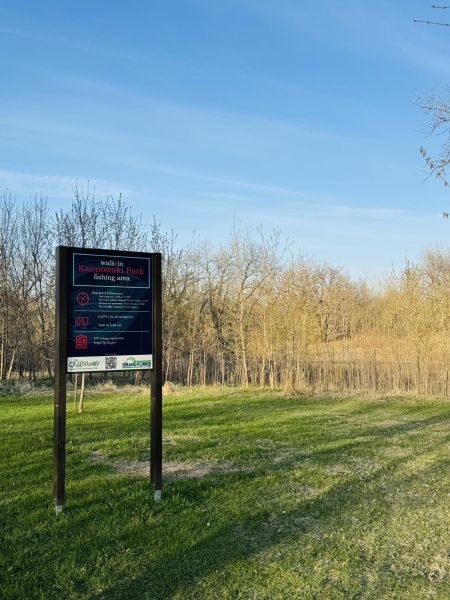Leaving memories behind
My great-uncle, Trygve Trooien, passed away just after twelve a.m. on the fifth of April. He went peacefully.
I would be willing to bet that none of you reading this have heard of Trygve Trooien. I’d be willing to bet even more money that most of you wouldn’t even know how to pronounce his name.
And honestly, there isn’t any reason for you to know anything about Tryg. He was a farmer who ran a small dairy in the Buffalo Ridge area of Minnesota and South Dakota. His farm was on the edge of a small lake. His equipment was handed down from generation to generation. For those of you familiar with the “Norwegian Bachelor Farmer” type that Garrison Keillor popularized in his radio show “A Prairie Home Companion,” you probably already know more about Tryg than I could ever tell you.
Tryg was a staple at every family meal that I can remember. He was my grandfather’s youngest brother, and lived only a mile from my grandparent’s homestead. He had a special love for my grandmother’s mashed potatoes. Dinner would be spent talking about the gossip of the area — Tryg was always privy to the juiciest, whether it was new gossip or old gossip that he found in family journals dating back to the late 1800s. Dinner would be spent with most of the family quietly listening while Tryg pontificated. I won’t lie, sometimes it got a bit tedious — I wasn’t interested in the local history as a teenager — I didn’t value just how much I was ignoring while trying to decide if I wanted another piece of lefse or not.
My father and Tryg were especially close. Even though Tryg was my grandfather’s brother, he and my father were only ten years apart in age. I can’t even begin to describe the depth of their relationship — not only to I not fully understand it, but I would be violating a privacy that I can’t really comprehend.
Since my Dad, Mom and I moved back to the area, Dad was always helping Tryg out around the farm. In the late spring, we became accustomed to getting calls at all hours of the night from Tryg. Sometimes it was a calf that decided to come into the world backwards. Sometimes it was a calf who was stuck in the birth canal and Tryg needed someone slight-of-build to sit on a rope — an old technique where one end of the rope was tied to the stuck calf, the other to a post in the barn, weight would be added slowly to the rope to help ease the calf out of the birth canal. My Dad’s little frame was the perfect amount of weight to safely ease the calf out without endangering the cow or the calf.
Any time of year, we’d sometimes get calls to help round up cattle that had escaped the fence. We’d put on our boots and barn-clothes and meet Tryg (always on his zippy little three-wheeler) on some back road wherever the cattle were. Tryg would zoom around on his three-wheeler, whooping and hollering, slowly and safely herding the cattle back into the pasture while the rest of us would catch the occasional Bess that decided to make a break for a dandelion away from the herd. I have no proof to back up this statement, but my gut tells me that Tryg took a bit of enjoyment in herding the cattle back to the pasture — they were like his children, little toddlers who got into all sorts of harmless trouble.
If you showed up at Tryg’s place for any reason, whether to pet the barn cats, see the newborn calf or just say hi, you were put to work. I’ve lost count of how many time Tryg had me whitewash one the doors in this barn (and it was always the same door!). Baleing season had my father an I on a flatbed for hours at a time while Tryg drove the tractor around in the 100 degree plus heat while we stacked the newly baled hay.
Trygve, or at least the Tryg I knew, was a hard worker — not because he had to be, but because he truly loved what he did. When he finally retired, it was not done lightly. And retirement for Tryg didn’t involve golf or early-bird specials — he stayed on his dairy. He dried up his milking cows, but he didn’t leave. He simply had his nephews pull more hours and hired more help. My father, who has a full time job as a professor at SDSU, helped on the weekends.
Tryg’s story isn’t spectacular nor is it a story that will change your life by reading it. I won’t deny that part of the reason I’m writing this article is for me, to aid in my grieving process. But that’s not my only reason.
I never valued Trygve’s legacy as much as I should have. The world hasn’t just lost a small-town farmer, but one whose ways are quickly dying out. Trygve valued history and the way things used to be done. His farm operated on these values, only accepting new technology when absolutely necessary. With him, traditions have ended, knowledge has been lost.
Maybe I’m in shock — I’m writing this about 24 hours after I got the call from my mother while she and my father were waiting for the coroner. Maybe that’s why I keep trying to find a lesson or a silver lining I can pass on to you, dear reader. But maybe that’s the problem — life isn’t a sitcom where every ending comes with a lesson.
What I can say for sure, and what I can pass onto you -not in the form of a lesson, but more of a thought- is that Tryg left this world with his boots on. He never stopped doing what he loved — even down to drinking the Mountain Dew that exacerbated his gout. He never left the farm. He never left the family. And this wasn’t a bad thing — he didn’t want to leave; he embraced the happiness where he found it. And I don’t think I can end my story — or he could have let his end — any better.
Kjerstine Trooien is a staff writer for The Dakota Student. She can be reached at [email protected].






